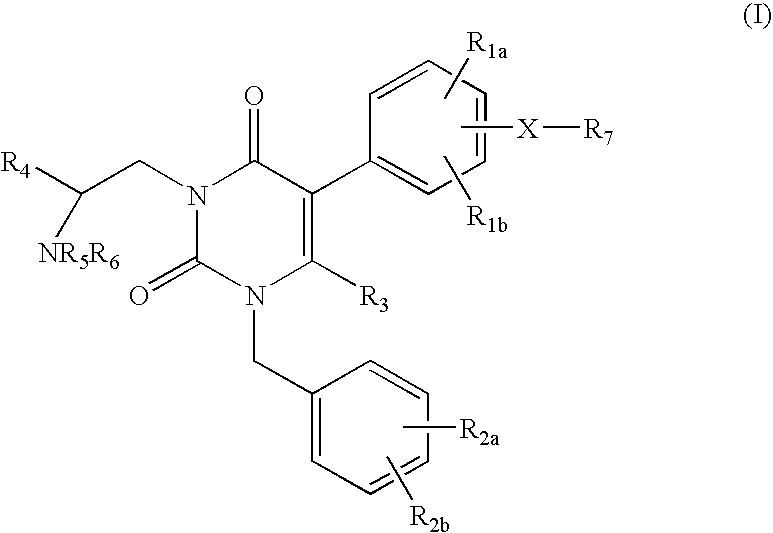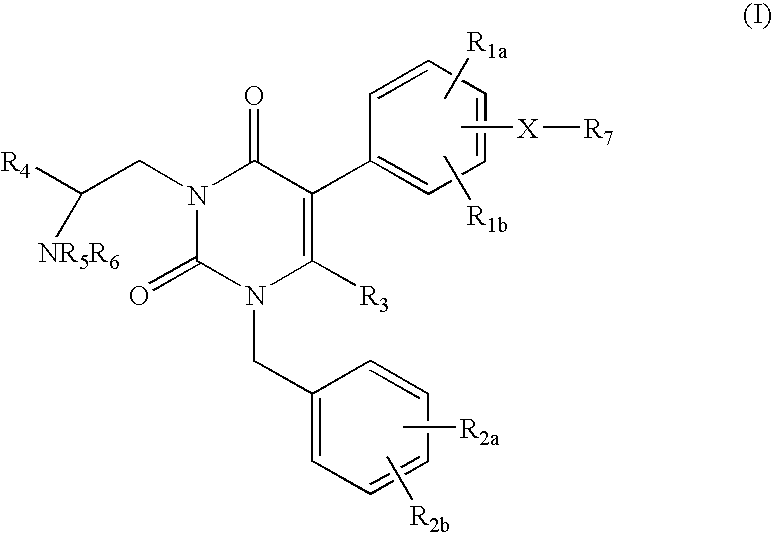Gonadotropin-releasing hormone receptor antagonists and methods relating thereto
a technology of gonadotropin and receptor antagonists, which is applied in the field of gonadotropin-releasing hormone receptor antagonists, can solve the problems of low bioavailability and adverse side effects of peptidic antagonists with low histamine release properties, and the clinical use of such antagonists
- Summary
- Abstract
- Description
- Claims
- Application Information
AI Technical Summary
Problems solved by technology
Method used
Image
Examples
example 1
3-[2(R)-AMINO-2-PHENYLETHYL]-5-(2-FLUORO-3-METHOXYPHENYL)-1-[2-FLUORO-6-(TRIFLUOROMETHYL)BENZYL]-6-METHYL-PYRIMIDINE-2,4(1H,3H)-DIONE
[0115]
Step 1A: Preparation of 2-fluoro-6-(trifluoromethyl)benzylamine 1a
[0116]To 2-fluoro-6-(trifluoromethyl)benzonitrile (45 g, 0.238 mmol) in 60 mL of THF was added 1 M BH3:THF slowly at 60° C. and the resulting solution was refluxed overnight. The reaction mixture was cooled to ambient temperature. Methanol (420 mL) was added slowly and stirred well. The solvents were then evaporated and the residue was partitioned between EtOAc and water. The organic layer was dried over Na2SO4. Evaporation gave 1a as a yellow oil (46 g, 0.238 mmol). MS (CI) m / z 194.0 (MH+).
Step 1B: Preparation of N-[2-fluoro-6-(trifluoromethyl)benzyl]urea 1b
[0117]To 2-fluoro-6-(trifluoromethyl)benzylamine 1a (51.5 g, 0.267 mmol) in a flask, urea (64 g, 1.07 mmol), HCl (conc., 30.9 mmol, 0.374 mmol) and water (111 mL) were added. The mixture was refluxed for 6 hours. The mixture wa...
example 2
3-[2(R)-AMINO-2-CYCLOHEXYLETHYL]-5-(2-FLUORO-3-METHOXYPHENYL)-1-[2,6-DIFLUOROBENZYL]-6-METHYL-PYRIMIDINE-2,4(1H,3H)-DIONE
[0125]
Step 2A: Preparation of tert-butyl 1-cyclohexyl-2-hydroxyethylcarbamate 2a
[0126]A solution of N-(t-butyloxycarbonyl)cyclohexylglycine (2.0 g, 7.77 mmol) in anhydrous THF (10 mL) was cooled to 0° C. Borane solution (1 M in THF, 15.5 mL, 15.5 mmol) was added slowly and the reaction mixture was warmed to room temperature and stirred for 2 hours. The reaction was quenched with MeOH (5 mL), volatiles were evaporated and the residue was partitioned between water and EtOAc. The organic layer was washed with saturated NaHCO3 / water, brine, dried (sodium sulfate), and evaporated to give tert-butyl 1-cyclohexyl-2-hydroxyethylcarbamate 2a (1.26 g, 66.7%), MS (CI) m / z 144.20 (MH+-Boc).
Step 2B: Preparation of 5-bromo-3-[2(R)-tert-butoxycarbonylamino-2-cyclohexylethyl]-1-[2,6-difluorobenzyl]-6-methyl-pyrimidine-2,4(1H,3H)-dione 2b
[0127]A solution of tert-butyl 1-cyclohexyl...
example 3
3-[2(R)-AMINO-2-PHENYLETHYL]-5-(2-CHLORO-3-METHOXYPHENYL)-1-[2-FLUORO-6-(TRIFLUOROMETHYL)BENZYL]PYRIMIDINE-2,4(1H,3H)-DIONE
[0130]
Step 3A: Preparation of 2-chloro-3-methoxybenzaldehyde 3a
[0131]To a suspension of 3-hydroxybenzaldehyde (20.12 g, 160 mmol) in HOAc (40 mL) was added carefully tBuOCl (20 mL, 176 mmol) with stirring. The reaction became a clear solution and strongly exothermic. It was allowed to cool and stirred for 16 hours, resulting in a white precipitate. The solid was filtered, washed with H2O and dried to give 2-chloro-3-hydroxybenzaldehyde (13.77 g, 55%), GCMS (EI) m / z 156, 158 (M+).
[0132]To a solution of 2-chloro-3-hydroxybenzaldehyde (4.55 g, 29 mmol) in DMF (30 mL) was added K2CO3 (4.8 g, 34.9 mmol) followed by MeI (2.7 mL, 43.6 mmol), and the mixture was stirred at room temperature for 16 hours. Following concentration in vacuo, the residual was taken up in ethyl acetate, washed with H2O, brine, dried over Na2SO4, and concentrated. Purification by column chromat...
PUM
 Login to View More
Login to View More Abstract
Description
Claims
Application Information
 Login to View More
Login to View More - R&D
- Intellectual Property
- Life Sciences
- Materials
- Tech Scout
- Unparalleled Data Quality
- Higher Quality Content
- 60% Fewer Hallucinations
Browse by: Latest US Patents, China's latest patents, Technical Efficacy Thesaurus, Application Domain, Technology Topic, Popular Technical Reports.
© 2025 PatSnap. All rights reserved.Legal|Privacy policy|Modern Slavery Act Transparency Statement|Sitemap|About US| Contact US: help@patsnap.com



